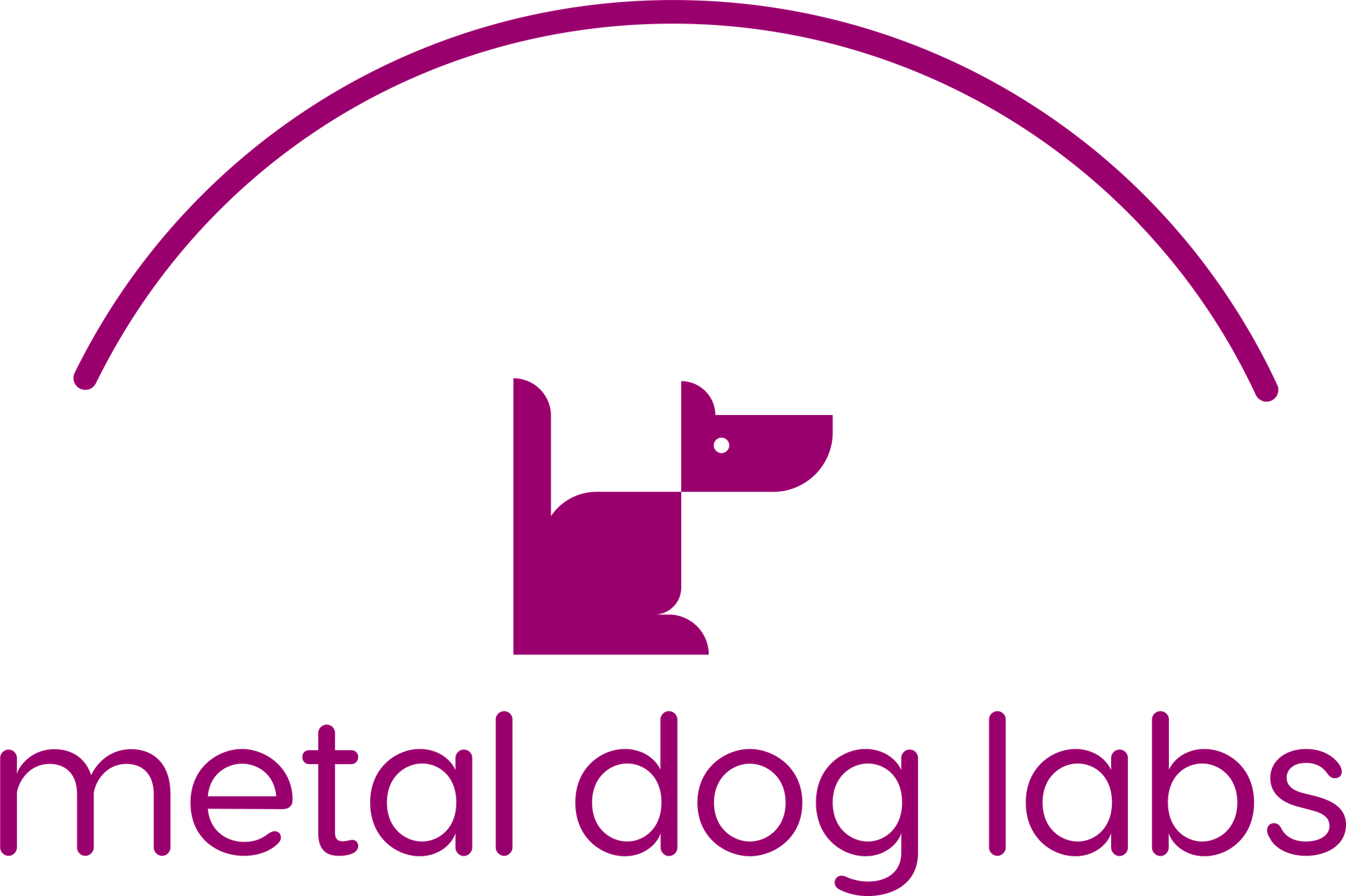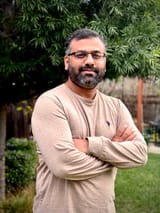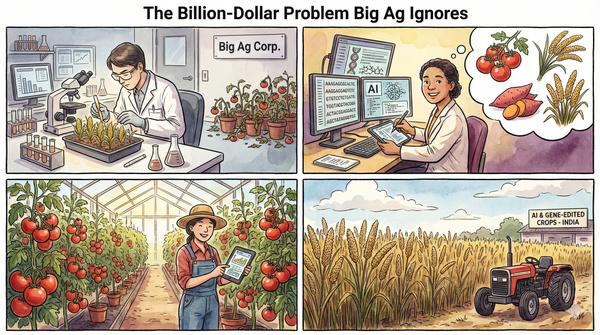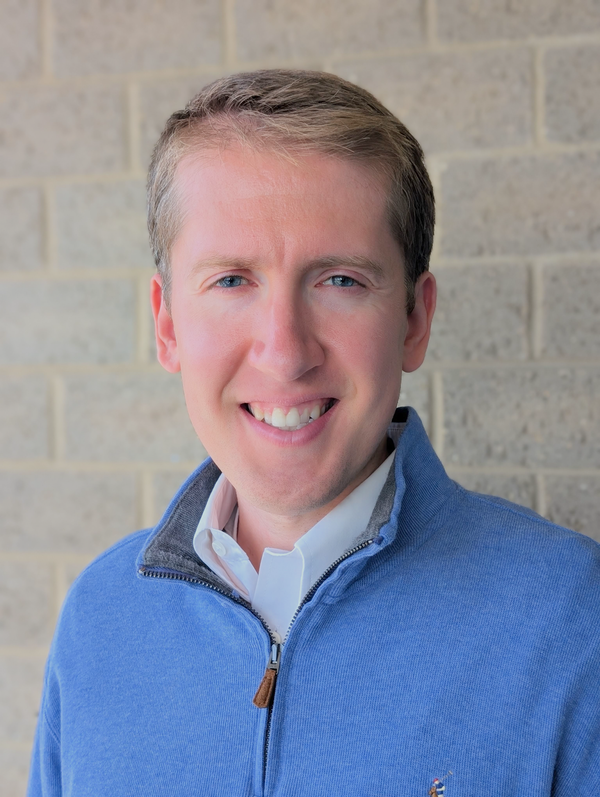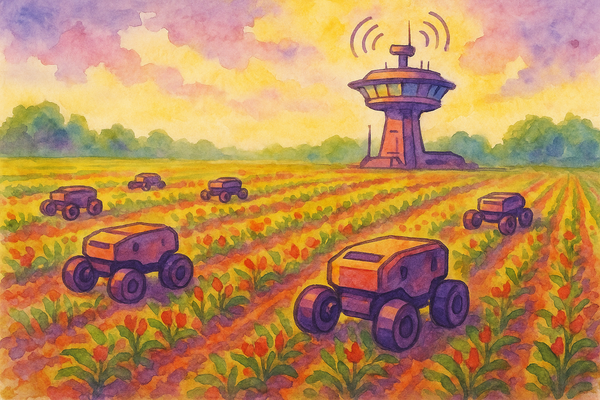Mackenzie Burnett: On Agriculture and American Progress

Mackenzie Burnett is a patriot. She is the CEO and co-founder of Ambrook, whose mission is to build a more prosperous and resilient future for America's family-run businesses. She believes in American values and wants to support independent businesses thrive and be resilient in the face of a changing world.
I first became aware of Mackenzie right around CoViD19. It was through the crypto craziness, when a bunch of people got together to buy a copy of the US Constitution, using the Constitution DAO. I had also thrown in a few hundred dollars (around Thanksgiving 2021) to get a shot at buying a copy of the US constitution which failed.
Mackenzie and I have stayed in touch over the years, though we never got a chance to talk one on one. This conversation was recorded before Ambrook announced their Series A round ($ 26.1 million). Mackenzie is the first guest on SFTW Convo who has been on Packy McCormick and TBPN.
I hope you enjoy this SFTW Convo, as much as I did!
Summary of the Conversation
In this conversation, Mackenzie and I discuss the challenges and opportunities for software engineers in addressing climate change, particularly through the lens of agriculture. She emphasizes the importance of incentive design, the evolving definitions of sustainability and resilience, and the role of technology in financial management for farmers.
Mackenzie and I discuss the role and importance of the American Dynamism moment and explore how it is tied to American Progress.
We touch on the complexities of agricultural ownership, the need for tailored solutions for multi-P&L businesses, and the significance of storytelling in connecting with producers. Ultimately, the conversation highlights the necessity of balancing economic resilience with environmental stewardship in the agricultural sector.

Rhishi: You once said it's difficult to fight climate change as a software engineer. I actually have almost the opposite reaction.
Mackenzie Burnett: In that video, I said it could feel difficult, and I think that’s still true. A lot of conversations I’ve had, with friends, candidates, even team members who ended up joining Ambrook, touch on this idea that there’s a real bifurcation in the kind of work people can do to address something as big and systemic as climate change.
On one side, you have direct solutions, deep tech or hardware-level innovations. And on the other, there’s software. But what I’ve come to see is that software, at its core, is really about incentive design.
That’s where that quote came from. I’ve talked to many software engineers who say, “I don’t feel like I have the skill set to go into deep tech or hardware.” They feel like their role is just building out UI or tools that make things easier, but not doing the actual climate work.
But if you look at incentive design, there are only so many levers to pull, carbon credit programs, policy-driven mechanisms, and so on. At Ambrook, we’ve tried to design something different. I spent a long time searching for a way to work on something that could build a more prosperous and resilient future.
That’s what Ambrook is about, taking a pragmatic approach and actually doing the everyday work that helps business owners across America make better decisions. Whether or not those decisions are explicitly about climate, they still build resilience. And that’s the spirit behind what I said.
Sustainability and Resilience
Rhishi: Incentive design plays a crucial role, especially when we’re talking about climate change or sustainability. How do you define sustainability?
Mackenzie Burnett: To me, sustainability means behaving in a way that doesn’t borrow from our children’s future. That’s the core idea.
Lately, though, I’ve found myself leaning more toward the word resilience. “Sustainability” still has value, it originally captured that idea of acting in ways that protect the future, but it’s also become a bit overused. In some cases, it’s even been co-opted for greenwashing or applied so broadly that it loses clarity or impact.
That’s why I prefer resilience, it gets more directly to the point. Resilience is about future-proofing. It means creating something that can hold up under a range of conditions, that can adapt, survive, and even thrive through uncertainty.
We’ve been talking about this with a lot of our customers, especially in terms of generational resilience. People are often motivated to act not just for themselves, but for others, for their families, their communities, future generations. That’s a fundamental part of how society works.
So while sustainability is still useful, my own definition is really rooted in this idea of resilience: building something that lasts and serves others, especially those who come after us.
Rhishi: It sounds great, it’s a solid bumper sticker. What does it actually mean to you, in a more personal or practical sense?
Mackenzie Burnett: When we talk to our customers, many of whom see themselves as stewards of their land and resources, we hear a consistent theme: it’s about taking no more than you need. It’s about leaving enough water in the creek during irrigation so the surrounding ecosystem can thrive. It’s about taking calculated risks.
And risk, at its core, is a future-oriented exercise.
When someone asks producers to join climate programs or adopt regenerative practices, they’re essentially asking them to take on business risk. That’s part of why we’re building financial management software at Ambrook, to help producers better understand their numbers.
If a producer wants to take the risk of implementing practices that could be better for their bottom line and better for the resources they’re stewarding for future generations, that’s great. But to do that, they need clarity. They need confidence in their financial picture. They need to know where they can take risks.
Over the five years we’ve been building Ambrook, our approach has evolved. We didn’t start with accounting software. We actually started during the pandemic, helping producers access working capital. We believed that unlocking capital could help them take longer-term risks and move toward higher-margin, more sustainable practices.
But we realized, as a team with software backgrounds, that we couldn’t really design effective incentives if producers didn’t have a clear understanding of their own numbers. So we had to go deeper, down the stack, to the fundamentals: double-entry accounting.
It sounds simple, but it’s powerful. You have to start by showing people exactly where they are. From there, you can help them build upward toward more strategic decisions.
That approach, meeting people where they are, has always been at the heart of our work.
And that’s why our mission is what it is: to build a more prosperous and resilient future for American farms and businesses.
Rhishi: My current hypothesis for AgTech software adoption is as follows.
First, there’s often a long gap between when someone uses the software and when they actually realize its value. The delay creates challenges around value attribution.
Second, there are so many confounding factors. Did I get a better yield because of what Mackenzie told me, or was it because we had better rainfall this year? It becomes really hard to isolate the impact.
And when we shift to more future-oriented ideas like resilience and risk management, the challenge gets even harder. How do you demonstrate short-term value in a way that makes someone say, “Yes, I see that I’m getting this value because of what Ambrook is doing.”
Mackenzie Burnett: We think about Ambrook’s value proposition across three timeframes.
The first is the present, and that’s all about clarity. It’s about helping people feel grounded in their day-to-day operations and saving them time. We've had customers tell us they’ve been able to cut their bookkeeping time by more than half using Ambrook, compared to what they were doing before, whether it was spreadsheets or other software. They feel like they’re able to make smarter decisions, faster. That’s the first layer: clarity and control in the now.
The second timeframe is confidence in the future. This is about financial foresight, being able to understand where things are working and where they’re not. We’ve seen great examples of this. A producer might say, “My replacement heifers are doing great, I should double down on that.” But then, looking at their hay enterprise, they might realize, “Once I factor in equipment costs and amortization, this part of the business doesn’t make sense as it’s currently operating.”
Historically, that kind of insight would require a fractional CFO, a banker, or a highly engaged accountant, someone who could really dig into financial analysis. But now, with Ambrook, producers are getting those insights on their own. It’s incredibly empowering. These aren't just abstract feelings, they’re decisions with real-world implications.
And then the third timeframe we think about is generational. What does this mean for my children’s future? Most of the businesses we serve are family-run, so legacy matters. And this is where resilience comes in, setting up systems and practices with multi-year paybacks, building toward a future that lasts.
That generational impact takes the most time to realize. But if we can get the first two timeframes right, clarity in the present and confidence in the future, then people start to believe in and see the path toward that third horizon.
Rhishi: A large number of farmers are operating on land they don’t actually own.
Do you see a difference in mindset when it comes to resilience and future-proofing between someone who’s renting and just operating the land versus someone who owns it?
I don’t think the issue is as simple as “do you rent or do you own land?” In reality, many of our producers do both. They may own part of their acreage and lease the rest to expand or to experiment. And often, they’re renting from family members. So it’s a much more complex and flexible landscape than it might appear on the surface.
Even among those who rent, we see a strong sense of stewardship. They take real pride in the land, in the quality of their product, and in the care they put into their inputs. That level of pride and responsibility doesn’t hinge solely on ownership.
Does your value proposition around resilience work well because of the space you're in? For instance, if you were selling this software to a plumber, sure, their son or daughter could take over the business, but there’s no land or natural resource to steward and pass down. Does that difference change how your message resonates?
Mackenzie Burnett: I think the key distinction often comes down to whether someone is essentially selling their labor, as a sole proprietor, or whether they actually own and operate the business. Most of the people we work with are owner-operators. They’re running the business themselves, and in many cases, it’s family-run and passed down through generations.
Our goal is to understand: what’s stopping more and more of these businesses from continuing that legacy?
One of our taglines is “stay independent,” and that really speaks to our core mission. It’s about continuing the tradition of the independent American entrepreneur, that spirit of self-reliance and ownership that we care deeply about.
Rhishi: When you started looking into this space, was this an unsolved problem? And if so, why? Is the problem actually unsolved? Why do you think that’s the case? And if it’s already been solved, then what are you doing differently that’s generating this kind of traction?
Mackenzie Burnett: It all comes down to who the problem is being solved for.
At Ambrook, we’re building financial management software for this era of fintech, where you can now bundle together banking, payments, accounting, inventory, payroll, and more. That kind of bundling has only become possible in the last few years. We were in the beta program for Stripe’s embedded finance platform from the start, and we're still building on top of capabilities that only recently became available.
On top of that, AI has opened up entirely new ways for people to interact with complex financial workflows. Our goal is to make it possible for someone without a financial background to perform sophisticated analysis, because AI lets you gesture at what you want, rather than having to know exactly how to do it. It’s about democratizing power-user functionality so that anyone can access it.
But the other key question is: who are we building this for?
Ambrook works across a range of industries. That’s true, and in fact, we were pulled there by our own customers. A lot of farms also run trucking or construction businesses, and they asked, “Can Ambrook work for this too?” The answer was often yes, because farmers, honestly, are some of the most entrepreneurial people I’ve ever met. They’re constantly spinning up side businesses, vertically integrating, doing whatever it takes to make the margins work.
So very early on, even with our second customer, we had to support more than just agriculture. And what we realized is that while we originally built the software with ag in mind, the underlying abstraction actually applies more broadly. Agriculture is a balance-sheet-heavy, multi–P&L business. But most of the financial tools out there, like QuickBooks, Xero, or FreshBooks, are designed for balance-sheet-light, single–P&L environments.
Those systems just aren’t built to handle the complexity of tracking assets, liabilities, nested accounts, and multiple profit centers. And the tools that can handle that, like Sage or NetSuite, cost upwards of $100,000 a year and require a team of financial professionals to implement and maintain. That’s completely out of reach for the small and midsize businesses we work with.
So we’re building for that gap.
Our mission is to give those businesses, the mom-and-pop shops, the independent operators running complex operations, the kind of financial power that, until now, was only available to large enterprises. And thanks to recent advances in fintech and AI, we can finally do that at an accessible price point.
We’re architecting everything today with that future in mind, so that people can access the kind of financial insight and decision-making power that used to require specialized expertise. Again, it’s about democratizing access to knowledge and skill.
That’s the space Ambrook is stepping into, and it’s a space that hasn’t been meaningfully served until now.
Pragmatic Environmentalism
Rhishi: What you’re focused on is really a bread-and-butter issue. How did you land on this as the problem you wanted to solve, as a software engineer looking to fight climate change?
Mackenzie Burnett: I just wanted to find a way to break into agriculture. I had fallen in love with the space. I spent a summer between my first and second year of grad school working in ag, driving around California’s Central Valley talking to farmers about water rights. And I thought, I need to figure out how to be part of this world.
At the time, my only real skill set was in software. So I asked myself: How can I use that to contribute here?
Before we even incorporated Ambrook, my co-founders and I spoke with nearly a hundred people, farmers, ranchers, policymakers, academics at Stanford, anyone who would talk to us. We asked them about the space, their work, and the problems they faced.
One thing came up again and again: access to working capital, but even more frequently, the challenge of paperwork. Back office tasks were eating up so much time and energy. That’s where we realized: this is a software problem. And software is really good at solving paperwork problems, good at streamlining workflows and creating structure where there’s chaos.
We heard from large, sophisticated producers, major citrus operations in the Central Valley, who still struggled to understand their true cost of production. That blew my mind. I assumed that would be a solved problem. But they were using outdated, expensive tools, exporting everything into spreadsheets, and relying on teams of people to manage their AR and AP.
It felt like a problem we could actually solve.
When it comes to conservation, climate, and sustainability, our approach is grounded in pragmatic environmentalism. And the pragmatic part starts with meeting people where they are. One of the biggest problems I’ve seen in this space is the disconnect between the people setting environmental standards and the producers being asked to meet them, producers who are already operating on razor-thin margins, barely staying afloat.
But when you actually talk to people, using language around resilience and generational stewardship, you find that they want the same things. They want to take care of their land. They want to preserve it for their kids. They want to maintain working lands as working lands.
What’s missing is the room to choose and understand for themselves, because every farm is different. You can’t push one-size-fits-all solutions. Just because a practice like cover cropping makes sense on one farm doesn’t mean it will on another.
So our goal at Ambrook is to make it easier for producers to understand their business in their own terms, to see what’s working, what could work with the right support, and what just doesn’t make sense. That clarity, the math behind the emotion, is what we’re trying to unlock.
When you strip away the labels, climate, sustainability, conservation, you’re left with smart business decisions. And when those align with practices that also benefit the environment or future generations, that’s just good common sense.
Because if you care about the land, you have to care about the people who are stewarding it.
Rhishi: Who's pushing the impractical environmentalism and why?
Mackenzie Burnett: I think we see this dynamic play out a lot, especially in supply chain discourse. You have standards coming from the top of the supply chain or from government policy, flowing all the way down. And while those standards are often well-intentioned, they don’t always map to the realities on the ground, what an actual operation looks like in practice.
What I wanted to enable was a stronger bottom-up response, a fighting chance for producers to say, “This doesn’t actually make sense for me, and here’s why.” I wanted to help them back that up with data and clarity.
Imagine being able to walk into the USDA or a local bank and confidently say, “I want a loan to implement these specific practices, and here’s the reasoning, here’s the math.” That kind of confidence changes the power dynamic. It gives producers the ability to engage in those conversations on equal footing.
To me, that’s what real bottom-up enablement looks like.
Even when we talk about American Dynamism, most of that discourse is still very top-down. It’s about launching big projects, backed by venture capital or government funding. And that work is important. But I’m more interested in what happens at the grassroots level, what it looks like when American Dynamism meets the American Dream.
That’s where true resilience comes from, not just environmental resilience, but economic resilience. And the truth is, you won’t get the former without the latter.
If we don’t create the conditions for economic resilience in these communities, we’ll never see the kind of environmental resilience we need.
Rhishi: What do you think farmers and ranchers need from a pragmatic environmentalist or resilience standpoint?
And do you believe those needs will start to bubble up to the people setting policy at the top of the supply chain?
Mackenzie Burnett: When our team attended the Sustainable Ag Summit, which happens annually, it was eye-opening in a few ways. First, there were surprisingly few producers in the room. That alone raises the question: Who’s actually participating in these conversations?
Second, for the producers who were there, a clear theme kept surfacing: the need for better benchmarking and more standardized, trustworthy data to guide decision-making. That stuck with me.
One producer said something I’ve thought about a lot since, that it’s not enough for a new practice or investment to just break even or yield a 1X return. It needs to deliver three to four times the return to justify the risk. Because producers are constantly weighing these decisions against every other part of their operation.
And that’s a really important point. So much of the broader sustainability discourse seems to assume that businesses have the margins to experiment, like that participating in a carbon credit program is just another line item. But that’s not the reality for our customers. They don’t have the room to throw money at a program just in case it works. It has to make economic sense first, it has to enable resilience before it can contribute to sustainability.
American Dynamism
Rhishi: You mentioned American Dynamism, and I’ve been following what A16Z and Katherine Boyle have been doing. As you said, much of the focus has been on heavy industries like steel, defense, semiconductors, and so on.
What would an “American Dynamism” version of agriculture look like?
Mackenzie Burnett: What we’re building with Ambrook, is about enabling a more prosperous and resilient future at whatever individual unit makes sense. That could be at the level of a community, a business, or even a single person.
I think that vision is a little different from the traditional top-down framing of American Dynamism. Though to be clear, I believe both are necessary. The thesis of “It’s Time to Build” is tightly intertwined with American Dynamism. And I agree with that spirit. But the real question becomes: how do you build the infrastructure that enables the type of activity you want to see?
Sometimes, that means building software that empowers thousands of small operators. Other times, it means investing in large-scale infrastructure that enables sweeping systemic change. You need both, and they have to work in concert, if you want real, resilient progress at the speed we need.
It’s kind of like building a city. A city is both organic and intentional. It depends on grassroots energy, walkable streets, local businesses, cultural vibrancy, but also on planning: zoning codes, highways, utilities, public transport. You can’t have one without the other.
That’s how I see this moment. We need both bottom-up and top-down systems to enable a truly resilient future.
Rhishi: Would something like broadband connectivity be part of this broader vision of infrastructure or connectivity?
Mackenzie Burnett: That’s actually a great example of the kind of thesis we’ve been talking about. Rural connectivity is a perfect case because it brings us back to the core question: for whom are we doing this work?
This is a bit of a tangent, but it’s something I’ve been thinking about a lot. I haven’t seen much strong academic research on the impact of rural decline on urban environments in the U.S. If you’ve come across any, I’d genuinely love to see it. I’ve searched a few times and haven’t found much.
We often hear about rural flight, but rarely do we talk about the feedback loop, how that affects cities economically, socially, or culturally. And I believe there is an economic impact when independent businesses and working lands fade out from rural communities. It’s hard to quantify because it’s not exactly zero-sum. There are definitely positive-sum examples in a lot of these dynamics.
But the real question is: what’s the right balance? What’s the right mix of economic models, subunits, and community types? I keep coming back to that idea of economic diversity and how we value it.
It’s a bit Jane Jacobs, but for rural America.
Our customers feel this very directly. The tax code, the value of land, the zip code they’re in, all of that affects how their business is perceived and how viable it is long term. And I keep wondering: How do we build a future where success is more tied to the value you build through your business than the land you happen to sit on?
Because right now, for many producers, land value is the retirement plan. That’s the store of wealth. But what if we could rebalance that? Not by stopping the free market, but by building businesses that are so productive and valuable that they can counterbalance those forces.
That’s the vision of a truly resilient and prosperous future, where long-term success comes from what you’ve built, not just what you’ve inherited.
Rhishi: The author Sarah Mock used the phrase “producers are land rich, cash poor.” Are you trying to help them make their business itself more valuable, not just rely on the value of the land?
Mackenzie Burnett: I think, for a lot of our customers, the reason they do this work is simply because they love it. They genuinely love having the opportunity to show up and do the work every day.
I was talking to a teammate recently, she’s trying to buy some farmland with her friends, and she said something that really stuck with me. She described it beautifully: sometimes all you want is the chance to throw your physical, emotional, and mental self into your work and feel proud at the end of the day. That in itself is the lifestyle.
It’s not office work. It’s full-bodied, full-hearted work. And farming is just too hard to do if you don’t love it.
So when I talk about making things more fair or more resilient, I’m not talking about making everyone cash-rich. I’m talking about leveling the playing field, so people can actually keep doing this work they love without being crushed by the system.
That kind of balance was more possible a few decades ago than it is today. Margins are tighter. There’s more exposure to macro conditions. And that’s another place where I see American Dynamism applying to agriculture, helping producers build resilience against forces outside their control.
There was a time when a war halfway around the world wouldn’t spike fertilizer or input costs here at home. Now it does. That volatility makes it even harder for producers to operate with confidence.
So what I’m really saying is: let’s give people a fighting chance to keep doing the work they love, the work that grounds them. That, to me, is the heart of it.
Rhishi: I especially appreciated your essay where you compared the American Dream to American Dynamism, one being bottom-up, the other more top-down.
When we talk about an “American Dynamism” version of ag, especially in the context of connectivity, what does that mean in practice? Is part of it about building resilience to macro shocks by shortening supply chains or reducing reliance on longer, more fragile global systems?
Mackenzie Burnett: I think it’s also about flexibility, about giving people more options within the supply chain so they can adapt. Every business owner should be able to optimize for what matters most to them, whether that’s values-driven goals, economic returns, or a mix of both. I really believe in the free market in that way.
A big part of the debate around hyper-globalization is that it creates fragility. When shocks hit, like geopolitical conflict, pandemics, or price spikes, the domestic market in the U.S. struggles to absorb and bounce back. And that’s where you see real long-term losses. For example, when we lose export capacity, it often never comes back, because the global supply chain has already optimized for a different, easier path.
So to me, one of the most important roles of government is to create the conditions that allow citizens to remain prosperous through the ups and downs of the macro cycle. It’s about enabling choice, and the diversification of that choice.
That connects directly to what we’re building at Ambrook. When we talk about “multi–P&L,” that’s exactly what we mean. During the pandemic, we saw this macro trend where small business owners, and not just in agriculture, started diversifying their income streams. But diversification introduces complexity.
Suddenly, you’re splitting expenses across five or six different business lines. Your profit centers are subsidizing each other in unpredictable ways. You’ve got multiple P&Ls under one roof. Most startups don’t deal with that level of financial complexity until they’re much bigger, at which point they move off QuickBooks and onto something like Sage or NetSuite.
But small businesses don’t always have that option. They can’t hire a full finance team. And that’s where we see opportunity to help.
Resilience often is diversification. But diversification adds complexity, and that’s where software should step in to help. Our goal is to close that gap: to keep the simple simple, but to make the complex possible.
We want to make it easier for these operators to scale, experiment, and stay resilient, without needing a finance department to do it.
Rhishi: I consider myself a fairly optimistic person, but one of my more cynical views, especially when it comes to commodity row crops, is that producing a commodity almost guarantees you'll always be a price taker.
Mackenzie Burnett: I think those dynamics are always present, there’s both stability and risk in being in the commodity business.
The stability comes from the infrastructure that already exists. There’s a deep base of knowledge infrastructure, physical infrastructure, and market infrastructure. That’s a real benefit of working in commodities, you don’t have to figure everything out yourself. You don’t have to build your own marketing channel from scratch. If you’re doing something new or different, you do have to build your own marketing strategy, and that’s a whole extra layer of complexity.
But the risk, as you mentioned, is real too. When you’re in commodities, you’re much more exposed to global market forces. And the more globalized the market becomes, the more rigid those conditions get. That makes adaptation harder.
That said, we’ve noticed that many of our row crop customers are diversifying their income. A lot of them are doing custom work, which is a very common form of income diversification. And I think that’s partly a response to those hardened global dynamics.
So what we’re seeing more and more is producers finding creative ways to make the math work. They’re adapting. And diversification, whether by necessity or by strategy, is becoming more common. We see that firsthand in our customer base.
Image source: USDA ERS
Rhishi: Who is the ideal customer for Ambrook?
Mackenzie Burnett: Our typical customers tend to be family-run businesses with the potential to scale. We work with operations doing millions in revenue as well as with businesses just breaking into commercial agriculture.
As I mentioned earlier, these are what we call complex SMBs, and they’re usually balance-sheet heavy. They manage real assets like equipment or land. Many also carry inventory, and most are dealing with various liabilities, including loans or even intercompany debt. Multi-entity structures are a common use case for Ambrook.
On the P&L side, our customers often manage multiple business lines, or what we call enterprises. Some have different locations, some are running franchises, and others want to drill down into field-level or project-level profitability. For example, contractors use Ambrook for job costing, and producers want to understand costs per acre or per field.
Of course, we also serve simpler businesses, single P&L operations or consultants who just want modern payment tools and easier tax filing. Ambrook works well for them, too.
What makes Ambrook unique is that it stretches to meet both ends of that spectrum, from simple use cases to highly complex financial structures. And that’s the result of solving a thousand small pain points, not just chasing one massive 10x leap, but consistently shaving off friction in all the places where legacy systems fail.
That’s how you build modern ERP software: not by solving one big problem, but by eliminating a thousand paper cuts. And we’ve been able to do that thanks to an exceptional product and design team. That’s really our superpower.
So today, we’re giving people the ability to perform complex analysis, like calculating cost per acre across enterprises, without needing to be a CFO. They just tag their transactions with the context they already know: “This field, this enterprise, this expense category, these apple trees.” Ambrook handles the rest.
We’ve spent a lot of time helping customers think about their finances in their own business language. That’s what unlocks confidence, and that’s what keeps the system intuitive, even as the underlying workflows get more sophisticated.
Rhishi: I believe your parents were with the USDA. What role do you see for the USDA, land grant universities, and public R&D to help producers become more resilient, especially in the face of climate, market, and operational shocks?
Mackenzie Burnett: I think, at the core of it, I’m just really patriotic. What I took away most deeply from my parents' work was a love of country, and especially a deep respect for the nobility of public service.
Of course, there are plenty of things to critique about the U.S. government, or any government, but I saw firsthand how meaningful that work can be. For my mom, who immigrated to the U.S., it was personal. I remember her telling me once that working in public service was her way of giving back to a country that had given so much to her. She took a lot of pride in that. My dad did too, but my mom connected it to her legacy in a really direct and emotional way.
Both of my parents worked for the USDA. Their job was to protect U.S. agriculture, specifically from imported pests and diseases. Most of their work focused on border policy, and what happens when outbreaks occur. My mom has a long history of working on the Longhorn Pine Beetle outbreak in the Northeast, for example.
So growing up, our dinner table conversations were different. Other kids’ parents might’ve talked about work in broad strokes, mine talked about citrus canker and fruit fly infestations. It was very wonky, very specific. But it gave me a real sense of how important that work is, how it supports the people stewarding our land, and how it protects American interests in ways that most people never think about.
I came to agriculture through my own path, but that was the background of my childhood. That deep, often invisible layer of public service, of people working behind the scenes to protect the systems we all rely on, left a lasting impression on me.
Natural and National Strategic Importance of Agriculture
Rhishi Pethe: There’s been a shift in acreage, especially for specialty crops like berries, out of California and into other countries like Peru and elsewhere in South America. A big part of that is rising production costs, driven by a mix of things: immigration challenges, regulation, and labor costs, and more.
Now, from a consumer perspective, you might say, “What’s the big deal? I just want a high-quality, nutritious product at a reasonable price. I don’t really care where it’s grown.”
But from a producer’s point of view, it’s very different. For someone who’s been farming the same land for five generations, it’s not just about cost, it’s about heritage and continuity. And their response is often, “Help me reduce costs or fix the system, so I can keep farming this land.”
Should agriculture be treated differently from other products that are globally sourced? Or should it be viewed like any other part of the supply chain, where price and efficiency rule?
Mackenzie Burnett: I think it's honestly why the mainstream conversation around American Dynamism is so compelling, it’s really about optimizing both our long-term and short-term interests in the United States.
Agriculture is a great example. It’s both naturally and nationally strategic, in much the same way as manufacturing or chip production. When we talk about chip manufacturing, for instance, it’s framed as a national security issue, because we literally can’t manufacture certain critical components domestically. Agriculture is similar. Protecting our national food supply is something we should want to do.
That’s why I believe we need to optimize not just at the individual level, but at the community or national level. Local communities, policymakers, and the federal government all have a stake in making that happen.
That’s also what makes the conversation around rebuilding domestic infrastructure and industry so critical. The macroeconomic environment is forcing us to face the consequences of optimizing only for hyper-individual consumer choice. We’re paying the cost now, and we’ll continue to pay it if we don’t change course.
I think it needs to be balanced. To me, it’s really about diversifying sourcing. The problem arises when the only option is to source from overseas, especially from countries that may not have the best interests of the United States at heart. That’s where it becomes risky.
So what matters most is diversification. In some cases, you do want to lean in and actively protect domestic production, like keeping working lands in operation.
So the real question is: how do we enable more producers to be good long-term stewards of the land? Because they want to be. The key is giving them the financial clarity, the margin, and the resources they need to do that well.
That’s another strong example of why diversification, support, and balance matter so much in how we think about resilience and land use.
Rhishi: In some cases, like with staples such as wheat or rice, I get the argument for maintaining domestic production. Maybe we should be self-sufficient there. But at the same time, if you look at a lot of economic history, the idea of full self-sufficiency is often critiqued. Thinkers like Hayek and others have written extensively about how self-sufficiency can become self-defeating.
Mackenzie Burnett: Sometimes the debate feels like it’s framed as either/or, but it shouldn’t be. Each community should have the ability to determine what the right balance looks like for them.
I don’t think it’s ever going to be all one or the other. There are plenty of situations where it absolutely makes sense to import, some regions have a clear comparative advantage, and we should be able to benefit from that. It’s useful, and in many cases, necessary.
The problem, the fragility, comes when things become so hyper-segmented and outsourced that we lose the ability, the skills, and the infrastructure to do it ourselves. That’s when we run into trouble, when a shock hits and we suddenly realize we can’t respond because we’ve let those capabilities atrophy.
Rhishi: Storytelling plays a big role in what you do at Ambrook. You’ve beautiful producer stories, your own newsletter, a blog, and even a podcast.
Where does that impulse to lean into storytelling come from, especially in a space like accounting or finance, which traditionally feels pretty dry?
Mackenzie Burnett: For me, it’s about ennobling the work in a way that’s true and authentic. It comes down to the question: what are we doing this for? That’s what gets me out of bed every morning.
I believe stories are the most powerful teaching tool we have as humans. And honestly, one of the most fulfilling things we’ve heard, many times, from customers is something like: “I never thought I’d say this, but bookkeeping actually feels fun now. I look forward to it.”
And that’s such a joy, to be able to create that experience for someone. It shows that anything can feel joyful and meaningful if it’s built thoughtfully, with care and craft, by people who genuinely care about the why behind the work.
So storytelling, for us, is just as much about connecting with our customers as it is about reminding ourselves why we do this every day.
Rhishi: Mackenzie, thank you for your time and I want to wish you the best of luck in your mission to help small businesses thrive and be resilient.
